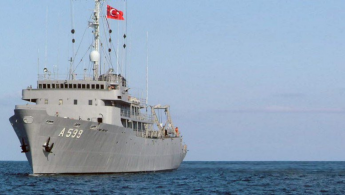Turkey accuses Greek jets of 'harassing' Turkish boat
A Greek plane was alleged to have dropped a chaff cartridge, used to disable radars, two miles away from a Turkish research vessel, as tensions in the Aegean rise again.
2 min read
Turkey sent a research vessel into international waters near Greek Islands last week [Twitter]
Turkey on Tuesday accused Greek fighter jets of "harassing" a Turkish boat in the Aegean as tensions rise again between the NATO allies over maritime issues.
Greece-Turkey ties are already strained over Ankara's gas exploration in the eastern Mediterranean, although they held direct talks last month for the first time in nearly five years.
In the dispute's latest chapter, Turkey last week sent the Cesme research vessel into international waters near some Greek islands, prompting Athens to lodge a diplomatic protest.
On Tuesday, a Turkish defence ministry source said four Greek F-16 fighter jets engaged in "provocative action" and "harassed the Cesme vessel in the northern Aegean's international waters".
Turkish Defence Minister Hulusi Akar told reporters that a "necessary response was given".
"Unfortunately, this is one of the frequent harassments by our Greek neighbours," Akar said in Ankara.
The Turkish defence source said one of the Greek planes dropped a chaff cartridge two nautical miles (3.7 nautical kilometres) away from the Turkish ship.
The cartridges are used to confuse or disable an opponent's radar.
The Greek defence ministry said its airforce was conducting a military exercise some distance from the Turkish vessel and denied any harassment.
"No Greek fighter jets flew near the Turkish vessel," Greek defence ministry said.
The scene was set for tensions when Turkey announced last Monday the Cesme ship would conduct a hydrographic survey from February 18 until March 2.
Greek government spokesman Christos Tarantilis called it "an unnecessary move which does not help positive sentiment".
Read also: A new chapter in Greece's Middle East military strategy
Akar defended Turkey's actions, insisting the survey was "completely hydrographic, technical" and saying Greece had conducted similar work in the past.
"Turkey has always been on the side of dialogue," Akar said.
Pushed by the European Union to hold talks, Turkish and Greek officials last month held exploratory talks in Istanbul, the first since 2016.
There was no breakthrough and the two sides only agreed for talks to resume in Athens.
The Greek foreign ministry said last week the next round in Athens could be held in early March, pending a reply from Turkey.
The crisis over the eastern Mediterranean re-erupted last summer when Ankara sent a research ship into waters claimed by Greece.
Greece-Turkey ties are already strained over Ankara's gas exploration in the eastern Mediterranean, although they held direct talks last month for the first time in nearly five years.
In the dispute's latest chapter, Turkey last week sent the Cesme research vessel into international waters near some Greek islands, prompting Athens to lodge a diplomatic protest.
On Tuesday, a Turkish defence ministry source said four Greek F-16 fighter jets engaged in "provocative action" and "harassed the Cesme vessel in the northern Aegean's international waters".
Turkish Defence Minister Hulusi Akar told reporters that a "necessary response was given".
"Unfortunately, this is one of the frequent harassments by our Greek neighbours," Akar said in Ankara.
The Turkish defence source said one of the Greek planes dropped a chaff cartridge two nautical miles (3.7 nautical kilometres) away from the Turkish ship.
The cartridges are used to confuse or disable an opponent's radar.
Twitter Post
|
"No Greek fighter jets flew near the Turkish vessel," Greek defence ministry said.
The scene was set for tensions when Turkey announced last Monday the Cesme ship would conduct a hydrographic survey from February 18 until March 2.
Greek government spokesman Christos Tarantilis called it "an unnecessary move which does not help positive sentiment".
Read also: A new chapter in Greece's Middle East military strategy
Akar defended Turkey's actions, insisting the survey was "completely hydrographic, technical" and saying Greece had conducted similar work in the past.
"Turkey has always been on the side of dialogue," Akar said.
Pushed by the European Union to hold talks, Turkish and Greek officials last month held exploratory talks in Istanbul, the first since 2016.
There was no breakthrough and the two sides only agreed for talks to resume in Athens.
The Greek foreign ministry said last week the next round in Athens could be held in early March, pending a reply from Turkey.
The crisis over the eastern Mediterranean re-erupted last summer when Ankara sent a research ship into waters claimed by Greece.





 Follow the Middle East's top stories in English at The New Arab on Google News
Follow the Middle East's top stories in English at The New Arab on Google News
![Israeli forces ordered bombed Gaza's Jabalia, ordering residents to leave [Getty]](/sites/default/files/styles/image_330x185/public/2176418030.jpeg?h=a5f2f23a&itok=_YGZaP1z)

